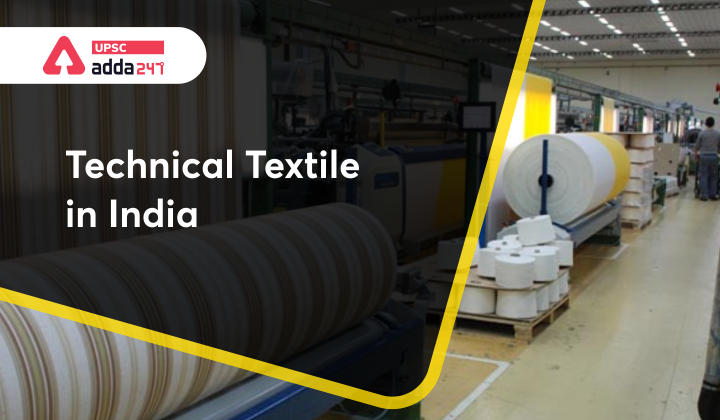Table of Contents
Technical Textiles in India- Relevance for UPSC Exam
- GS Paper 3: Science and Technology- Developments and their applications and effects in everyday life.
Technical Textiles in India- Context
- Recently, Union Minister for Textiles said that India should aim to target a 5 times increase in export of Technical Textiles in the next 3 years.
- Centre is expected to support PLIs for Textile Sector in States supporting the development and offering affordable infrastructure for Textile Manufacturing like cheap land and power.
Technical Textiles in India- Key Points
- About: Technical textiles are defined as textile materials and products used primarily for their technical performance and functional properties rather than their aesthetic or decorative characteristics.
- Other terms used for defining technical textiles include industrial textiles, functional textiles, performance textiles, engineering textiles, invisible textiles and hi-tech textiles.
- Use: Technical textiles are used individually or as a component/part of another product.
- Technical textiles are used individually to satisfy specific functions such as fire-retardant fabric for uniforms of firemen and coated fabric to be used as awnings.
- As a component or part of another product, they are used to enhance the strength, performance or other functional properties of that product.
- Key characteristics: Technical textiles are preferred due to following features
- Health & safety;
- Cost effectiveness;
- Durability;
- High strength;
- Light weight;
- Versatility;
- Customization;
- User friendliness;
- Eco friendliness;
- Logistical convenience, etc.
Technical Textiles in India- Key Potential
- Contribution in Indian Economy: Technical textile accounts for approximately 13% of India’s total textile and apparel market and contributes to India’s GDP at 0.7%.
- There is a huge potential to fulfil a large demand gap as the consumption of technical textiles in India is still only at 5-10% against 30-70% in some of the advanced countries.
- National Technical Textiles Mission: It has been set up with an aim to ensure-
- An average growth rate of 15-20% to increase the domestic market size of technical textiles to $ 40-50 Bn by the year 2024
- This is to be achieved through market development, market promotion, international technical collaborations, investment promotions and Make in India initiative.
- Global Potential: The demand for technical textiles was pegged at $ 165 Bn in the year 2018 and is expected to grow up to $ 220 Bn by 2025, at a CAGR of 4% from 2018-25.
Technical Textiles in India- Types of technical textiles
- Depending on the product characteristics, functional requirements and end-use applications the highly diversified range of technical textile are grouped into 12 segments. These are-
-
- AGROTECH (AGRO TEXTILES): For example- Bird Protection Nets, Monofil Nets, Fruit Covers, Weed Control Fabric, etc.
- BUILDTECH (CONSTRUCTION TEXTILES): For example- Scaffolding Nets, Hoardings / Signages, Architectural Membranes,
- CLOTHTECH (CLOTHING TEXTILES): For example- Sewing threads, Shoe laces, Interlining, Zip Fasteners, etc.
- GEOTECH (GEO TEXTILES): For example- Construction of roads, River Canal and coastal work, Sports field construction, etc.
- HOMETECH (HOME TEXTILES): For example- Carpet Backing Cloth, Stuffed toys, HVAC filters, Mattresses and pillows, etc.
- INDUTECH (INDUSTRIAL TEXTILES): For example- DECATISING CLOTH, CONVEYOR BELTS, Printed Circuit Board, Ropes and Cordages, Composites, Industrial Brushes, etc.
- MEDITECH (MEDICAL TEXTILES): For example- Baby Diapers, Incontinence Diapers, Surgical Disposables, Surgical Dressing Material, etc.
- MOBILTECH (AUTOMOTIVE TEXTILES): For example- Nylon tyre cord, Seat belt webbing, Car upholstery/ Seat cover fabrics, Automotive Airbags, Helmets, Railways seat cover fabric, etc.
- PACKTECH (PACKAGING TEXTILES): For example- Polyolefin Woven Sacks, Flexible Intermediate Bulk Containers (FIBC), Wrapping Fabric, etc.
- PROTECH (PROTECTIVE TEXTILES): For example- Industrial Gloves, High altitude clothing, Chemical Protective Clothing (CPC), etc.
- SPORTTECH (SPORTS TEXTILES): For example- Parachute Fabrics, Sports Shoe Components, Sleeping Bags, Artificial turf, etc.
- OEKOTECH: For example- Recycling, Waste disposal, environment protection, etc.





 TSPSC Group 1 Question Paper 2024, Downl...
TSPSC Group 1 Question Paper 2024, Downl...
 TSPSC Group 1 Answer key 2024 Out, Downl...
TSPSC Group 1 Answer key 2024 Out, Downl...
 UPSC Prelims 2024 Question Paper, Downlo...
UPSC Prelims 2024 Question Paper, Downlo...




